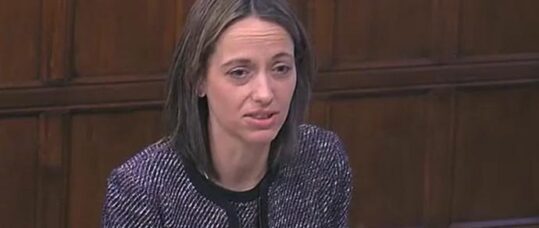Health minister fails to commit to safe staffing law

A health minister has failed to commit to introducing safe staffing law in England despite acknowledging the importance of plugging workforce gaps.
Helen Whately claimed the Government’s pledge for 50,000 more nurses would ensure high vacancy rates were a ‘thing of the past’, during a debate on the nursing workforce in Westminster Hall on Tuesday.
The session came after months of campaigning by the RCN calling for the introduction of safe staffing law, which would hold leaders accountable for nursing levels in England.
Labour MP Mohammad Yasin, who led the debate as the ‘voice’ for the RCN, called the minister’s response to the concerns raised, including when she was asked to commit to safe staffing, ‘disappointing’.
Related Article: New digital support for community nurses in 10-year plan
‘We are in crisis when it comes to nursing vacancies and getting nurses into jobs,’ he said. ‘The Government needs to take action now, before it is too late.’
He told the Commons it is ‘shocking’ that ‘there is no clarity in law on the role of responsibility and accountability for growing and developing our health and care workforce’.
In response, Ms Whatley acknowledged that nursing vacancy rates were ‘too high’ and that the NHS needed to be ‘looking after its nurses’.
She noted that bank and agency staff were used ‘to make wards safe’ but that it was not the ‘same as having a fully staffed team’.
‘[Fully staffed teams] will make the NHS a great place to work and enable it to provide the best possible care for patients,’ she added.
‘That is why the Government have committed to 50,000 more nurses, so that staff shortages and those high vacancy rates will be a thing of the past.’
Related Article: Nurse had to ‘freeze’ PPE during pandemic to re-use in care home, Covid inquiry hears
Chief executive of the Queen’s Nursing Institute Crystal Oldman said she was concerned the ‘debate around nursing shortages has been too focused on hospital nurses’.
‘The shortage of qualified nurses in community specialisms, for example district nursing, learning disability nursing and community mental health nursing is more serious than that in the nursing workforce as a whole,’ she added.
‘The Government has announced measures to support students studying in these specialisms, but it is too early to tell if these will be sufficient to reverse the declines that have been seen over the past decade.’
The Government has said – on top of the £5,000 maintenance grant available to all student nurses from September 2020 – an extra £1,000 will be available in disciplines ‘struggling to recruit’, such as learning disability and mental health nursing
Related Article: Tell us what practice nursing means to you and potentially win £1,000
The latest figures show that health visitor numbers decreased between November 2018 and November last year, falling from 7,780 to 6,975.
Although mental health nurse numbers are up by 915 from November 2018 to 37,314 in November 2019, they are still down by 3,496 from the same point in 2009.

See how our symptom tool can help you make better sense of patient presentations
Click here to search a symptom


A health minister has failed to commit to introducing safe staffing legislation in England despite acknowledging the importance of plugging workforce gaps.



